Free Online Productivity Tools
i2Speak
i2Symbol
i2OCR
iTex2Img
iWeb2Print
iWeb2Shot
i2Type
iPdf2Split
iPdf2Merge
i2Bopomofo
i2Arabic
i2Style
i2Image
i2PDF
iLatex2Rtf
Sci2ools
OOPSLA
2004
Springer
2004
Springer
The garbage collection advantage: improving program locality
As improvements in processor speed continue to outpace improvements in cache and memory speed, poor locality increasingly degrades performance. Because copying garbage collectors move objects, they have an opportunity to improve locality. However, no static copying order is guaranteed to match program traversal orders. This paper introduces online object reordering (OOR) which includes a new dynamic, online class analysis for Java that detects program traversal patterns and exploits them in a copying collector. OOR uses runtime method sampling that drives just-in-time (JIT) compilation. For each hot (frequently executed) method, OOR analysis identifies the hot field accesses. At garbage collection time, the OOR collector then copies referents of hot fields together with their parent. Enhancements include static analysis to exclude accesses in cold basic blocks, heuristics that decay heat to respond to phase changes, and a separate space for hot objects. The overhead of OOR is on av...
Related Content
| Added | 02 Jul 2010 |
| Updated | 02 Jul 2010 |
| Type | Conference |
| Year | 2004 |
| Where | OOPSLA |
| Authors | Xianglong Huang, Stephen M. Blackburn, Kathryn S. McKinley, J. Eliot B. Moss, Zhenlin Wang, Perry Cheng |
Comments (0)

